少儿英语分级阅读怎么开展
- 格式:docx
- 大小:114.13 KB
- 文档页数:2
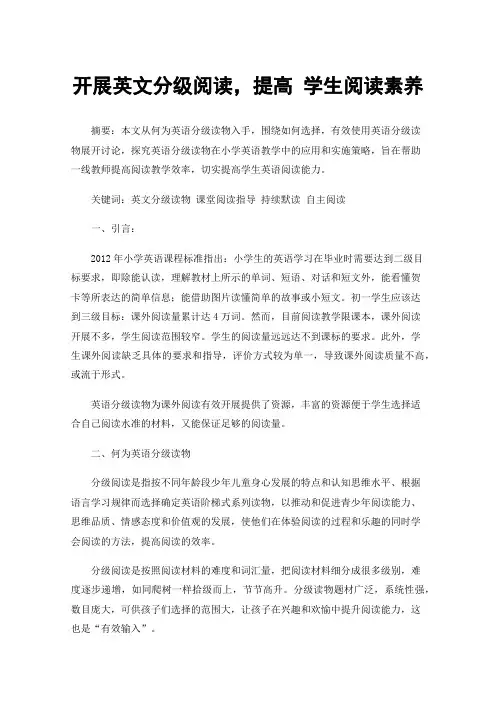
开展英文分级阅读,提高学生阅读素养摘要:本文从何为英语分级读物入手,围绕如何选择,有效使用英语分级读物展开讨论,探究英语分级读物在小学英语教学中的应用和实施策略,旨在帮助一线教师提高阅读教学效率,切实提高学生英语阅读能力。
关键词:英文分级读物课堂阅读指导持续默读自主阅读一、引言:2012年小学英语课程标准指出:小学生的英语学习在毕业时需要达到二级目标要求,即除能认读,理解教材上所示的单词、短语、对话和短文外,能看懂贺卡等所表达的简单信息;能借助图片读懂简单的故事或小短文。
初一学生应该达到三级目标:课外阅读量累计达4万词。
然而,目前阅读教学限课本,课外阅读开展不多,学生阅读范围较窄。
学生的阅读量远远达不到课标的要求。
此外,学生课外阅读缺乏具体的要求和指导,评价方式较为单一,导致课外阅读质量不高,或流于形式。
英语分级读物为课外阅读有效开展提供了资源,丰富的资源便于学生选择适合自己阅读水准的材料,又能保证足够的阅读量。
二、何为英语分级读物分级阅读是指按不同年龄段少年儿童身心发展的特点和认知思维水平、根据语言学习规律而选择确定英语阶梯式系列读物,以推动和促进青少年阅读能力、思维品质、情感态度和价值观的发展,使他们在体验阅读的过程和乐趣的同时学会阅读的方法,提高阅读的效率。
分级阅读是按照阅读材料的难度和词汇量,把阅读材料细分成很多级别,难度逐步递增,如同爬树一样拾级而上,节节高升。
分级读物题材广泛,系统性强,数目庞大,可供孩子们选择的范围大,让孩子在兴趣和欢愉中提升阅读能力,这也是“有效输入”。
三、如何选择英语分级读物目前中国市场上的分级读物,一般分为直接引进的国外原版分级读物和国内出版的分级读物。
国外分级读物比较丰富,适合小学生阅读的有:牛津大学出版社出版的《Oxford Reading Tree 牛津阅读树》;HarperCollins出版的I Can Read!系列儿童英语读本;英国培生集团出版的培生英语分级阅读,国内已出版的有《培生幼儿英语分级读物》和《培生儿童英语分级阅读》;英国哈考特教育出版公司子公司海尼曼(Heinemann)出版的Heinemann分级读物,有GK,G1和G2三个级别298本;国内高等教育出版社从美国著名的分级阅读系列PM选取精华引进出版了《体验英语少儿阅读文库》;英国柯林斯出版公司出版的《Collins Big Cat大猫英语分级读物》;英国哈考特教育出版公司(Harcourt Education)出版的《哈考特》系列;美国在线分级阅读《Reading A to Z》。
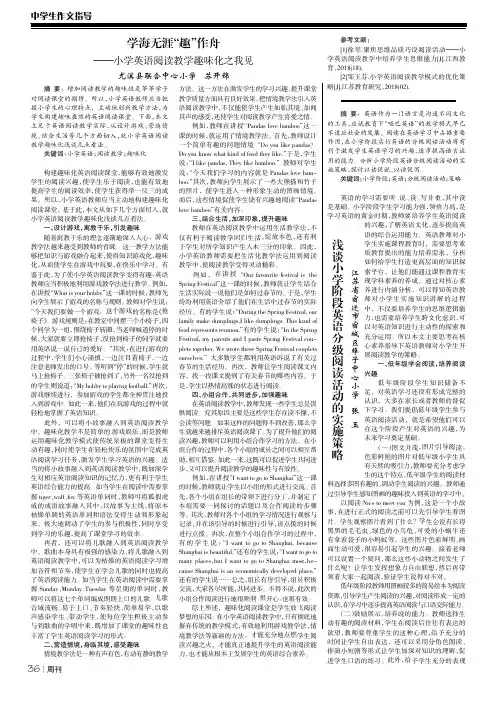
摘要:增加阅读教学的趣味性是莘莘学子对阅读课堂的期待。
所以,小学英语教师应当把握小学生的心理特点,主动地创新教学方法,为学生构建趣味盎然的英语阅读课堂。
下面,本文立足于英语阅读教学实际,从设计游戏、营造情境、结合生活等几个方面切入,就小学英语阅读教学趣味化浅谈几点看法。
关键词:小学英语;阅读教学;趣味化构建趣味化英语阅读课堂,能够有效地激发学生的阅读兴趣,使学生乐于阅读,也能有效地提高学生的阅读效率,使学生获得举一反三的成果。
所以,小学英语教师应当主动地构建趣味化阅读课堂。
基于此,本文从如下几个方面切入,就小学英语阅读教学趣味化浅谈几点看法。
一、设计游戏,寓教于乐,引发趣味随着寓教于乐的理念逐渐地深入人心,游戏教学法越来越受到教师的青睐。
这一教学方法能够把知识与游戏融合起来,使得知识游戏化,趣味化,从而使学生在游戏中玩耍,在快乐中学习。
有鉴于此,为了使小学英语阅读教学变得有趣,英语教师应当积极地利用游戏教学法进行教学。
例如,在讲授“What is your hobby”这一课的时候,教师先向学生展示了游戏的名称与规则。
教师对学生说:“今天我们要做一个游戏。
这个游戏的名称是《抢椅子》。
游戏规则是:在教室中间摆三个小椅子,四个同学为一组,围绕椅子转圈,当老师喊道停的时候,大家就要立即抢椅子,没抢到椅子的同学就要用英语说一说自己的爱好。
”其次,在进行游戏的过程中,学生们小心谨慎,一边注目着椅子,一边注意老师发出的口号。
等听到“停”的时候,学生就马上抢椅子。
三张椅子被抢到了,另外一名没抢到的学生则说道:“My hobby is playing football.”再次,游戏继续进行,参加游戏的学生都全神贯注地投入到游戏中。
如此一来,他们在玩游戏的过程中就轻松地掌握了英语知识。
此外,可以将小故事融入到英语阅读教学中。
趣味化教学不是简单的.游戏娱乐,而是教师运用趣味化教学模式使传统呆板的课堂变得生动有趣,同时使学生在轻松快乐的氛围中完成英语阅读学习任务,激发学生学习英语的兴趣。
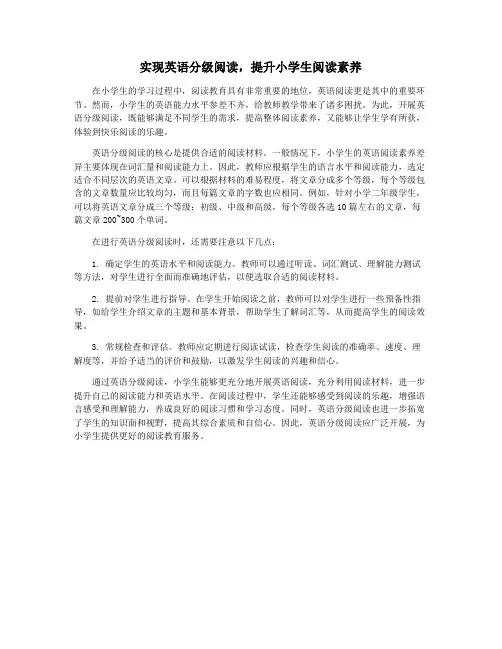
实现英语分级阅读,提升小学生阅读素养在小学生的学习过程中,阅读教育具有非常重要的地位,英语阅读更是其中的重要环节。
然而,小学生的英语能力水平参差不齐,给教师教学带来了诸多困扰。
为此,开展英语分级阅读,既能够满足不同学生的需求,提高整体阅读素养,又能够让学生学有所获,体验到快乐阅读的乐趣。
英语分级阅读的核心是提供合适的阅读材料。
一般情况下,小学生的英语阅读素养差异主要体现在词汇量和阅读能力上。
因此,教师应根据学生的语言水平和阅读能力,选定适合不同层次的英语文章。
可以根据材料的难易程度,将文章分成多个等级,每个等级包含的文章数量应比较均匀,而且每篇文章的字数也应相同。
例如,针对小学二年级学生,可以将英语文章分成三个等级:初级、中级和高级,每个等级各选10篇左右的文章,每篇文章200~300个单词。
在进行英语分级阅读时,还需要注意以下几点:1. 确定学生的英语水平和阅读能力。
教师可以通过听读、词汇测试、理解能力测试等方法,对学生进行全面而准确地评估,以便选取合适的阅读材料。
2. 提前对学生进行指导。
在学生开始阅读之前,教师可以对学生进行一些预备性指导,如给学生介绍文章的主题和基本背景,帮助学生了解词汇等,从而提高学生的阅读效果。
3. 常规检查和评估。
教师应定期进行阅读试读,检查学生阅读的准确率、速度、理解度等,并给予适当的评价和鼓励,以激发学生阅读的兴趣和信心。
通过英语分级阅读,小学生能够更充分地开展英语阅读,充分利用阅读材料,进一步提升自己的阅读能力和英语水平。
在阅读过程中,学生还能够感受到阅读的乐趣,增强语言感受和理解能力,养成良好的阅读习惯和学习态度。
同时,英语分级阅读也进一步拓宽了学生的知识面和视野,提高其综合素质和自信心。
因此,英语分级阅读应广泛开展,为小学生提供更好的阅读教育服务。
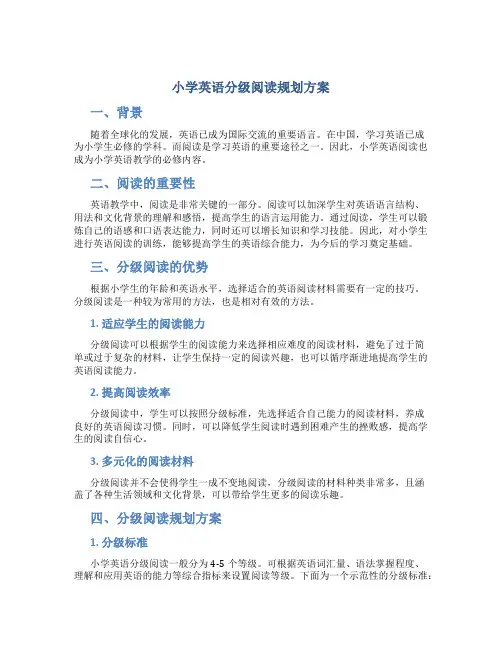
小学英语分级阅读规划方案一、背景随着全球化的发展,英语已成为国际交流的重要语言。
在中国,学习英语已成为小学生必修的学科。
而阅读是学习英语的重要途径之一。
因此,小学英语阅读也成为小学英语教学的必修内容。
二、阅读的重要性英语教学中,阅读是非常关键的一部分。
阅读可以加深学生对英语语言结构、用法和文化背景的理解和感悟,提高学生的语言运用能力。
通过阅读,学生可以锻炼自己的语感和口语表达能力,同时还可以增长知识和学习技能。
因此,对小学生进行英语阅读的训练,能够提高学生的英语综合能力,为今后的学习奠定基础。
三、分级阅读的优势根据小学生的年龄和英语水平,选择适合的英语阅读材料需要有一定的技巧。
分级阅读是一种较为常用的方法,也是相对有效的方法。
1. 适应学生的阅读能力分级阅读可以根据学生的阅读能力来选择相应难度的阅读材料,避免了过于简单或过于复杂的材料,让学生保持一定的阅读兴趣,也可以循序渐进地提高学生的英语阅读能力。
2. 提高阅读效率分级阅读中,学生可以按照分级标准,先选择适合自己能力的阅读材料,养成良好的英语阅读习惯。
同时,可以降低学生阅读时遇到困难产生的挫败感,提高学生的阅读自信心。
3. 多元化的阅读材料分级阅读并不会使得学生一成不变地阅读,分级阅读的材料种类非常多,且涵盖了各种生活领域和文化背景,可以带给学生更多的阅读乐趣。
四、分级阅读规划方案1. 分级标准小学英语分级阅读一般分为4-5个等级。
可根据英语词汇量、语法掌握程度、理解和应用英语的能力等综合指标来设置阅读等级。
下面为一个示范性的分级标准:•初级:学过200个左右的常用单词,掌握10种常用英语基本句型,能够理解简单的英语短文,如绘本、儿童简单故事等;•中级:词汇量达到500左右,掌握30种左右的英语基本句型,可以理解一些中等难度的英语短文,如一些名人小传等;•高级:词汇量达到1000以上,熟练掌握常见的英语语法,可以阅读一些较长、较难的英语文章和小说,如短篇小说、科幻小说等;•进阶:超过3000的词汇量,对英语语法掌握熟练,能够阅读各种时代的英美名著、历史、文化等文章,如莎士比亚名剧、经典文学等。
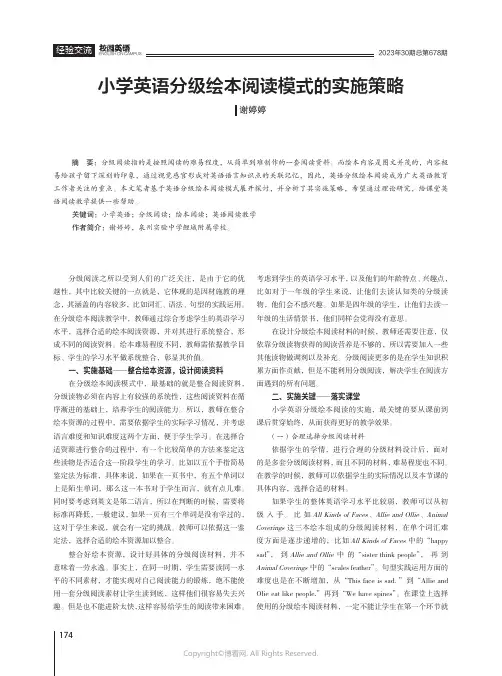
ENGLISH ON CAMPUS2023年30期总第678期小学英语分级绘本阅读模式的实施策略摘 要:分级阅读指的是按照阅读的难易程度,从简单到难制作的一套阅读资料。
而绘本内容是图文并茂的,内容极易给孩子留下深刻的印象,通过视觉感官形成对英语语言知识点的关联记忆,因此,英语分级绘本阅读成为广大英语教育工作者关注的重点。
本文笔者基于英语分级绘本阅读模式展开探讨,并分析了其实施策略,希望通过理论研究,给课堂英语阅读教学提供一些帮助。
关键词:小学英语;分级阅读;绘本阅读;英语阅读教学作者简介:谢婷婷,泉州实验中学鲤城附属学校。
分级阅读之所以受到人们的广泛关注,是由于它的优越性,其中比较关键的一点就是,它体现的是因材施教的理念,其涵盖的内容较多,比如词汇、语法、句型的实践运用。
在分级绘本阅读教学中,教师通过综合考虑学生的英语学习水平,选择合适的绘本阅读资源,并对其进行系统整合,形成不同的阅读资料。
绘本难易程度不同,教师需依据教学目标、学生的学习水平做系统整合,彰显其价值。
一、实施基础——整合绘本资源,设计阅读资料在分级绘本阅读模式中,最基础的就是整合阅读资料,分级读物必须在内容上有较强的系统性,这些阅读资料在循序渐进的基础上,培养学生的阅读能力。
所以,教师在整合绘本资源的过程中,需要依据学生的实际学习情况,并考虑语言难度和知识难度这两个方面,便于学生学习。
在选择合适资源进行整合的过程中,有一个比较简单的方法来鉴定这些读物是否适合这一阶段学生的学习。
比如以五个手指简易鉴定法为标准,具体来说,如果在一页书中,有五个单词以上是陌生单词,那么这一本书对于学生而言,就有点儿难。
同时要考虑到英文是第二语言,所以在判断的时候,需要将标准再降低,一般建议,如果一页有三个单词是没有学过的,这对于学生来说,就会有一定的挑战。
教师可以依据这一鉴定法,选择合适的绘本资源加以整合。
整合好绘本资源,设计好具体的分级阅读材料,并不意味着一劳永逸。
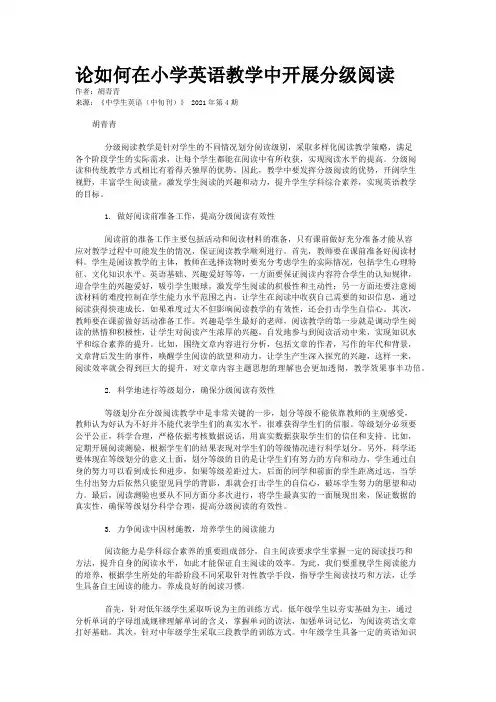
论如何在小学英语教学中开展分级阅读作者:胡青青来源:《中学生英语(中旬刊)》 2021年第4期胡青青分级阅读教学是针对学生的不同情况划分阅读级别,采取多样化阅读教学策略,满足各个阶段学生的实际需求,让每个学生都能在阅读中有所收获,实现阅读水平的提高。
分级阅读和传统教学方式相比有着得天独厚的优势,因此,教学中要发挥分级阅读的优势,开阔学生视野,丰富学生阅读量,激发学生阅读的兴趣和动力,提升学生学科综合素养,实现英语教学的目标。
1. 做好阅读前准备工作,提高分级阅读有效性阅读前的准备工作主要包括活动和阅读材料的准备,只有课前做好充分准备才能从容应对教学过程中可能发生的情况,保证阅读教学顺利进行。
首先,教师要在课前准备好阅读材料。
学生是阅读教学的主体,教师在选择读物时要充分考虑学生的实际情况,包括学生心理特征、文化知识水平、英语基础、兴趣爱好等等,一方面要保证阅读内容符合学生的认知规律,迎合学生的兴趣爱好,吸引学生眼球,激发学生阅读的积极性和主动性;另一方面还要注意阅读材料的难度控制在学生能力水平范围之内,让学生在阅读中收获自己需要的知识信息,通过阅读获得快速成长,如果难度过大不但影响阅读教学的有效性,还会打击学生自信心。
其次,教师要在课前做好活动准备工作。
兴趣是学生最好的老师,阅读教学的第一步就是调动学生阅读的热情和积极性,让学生对阅读产生浓厚的兴趣,自发地参与到阅读活动中来,实现知识水平和综合素养的提升。
比如,围绕文章内容进行分析,包括文章的作者,写作的年代和背景,文章背后发生的事件,唤醒学生阅读的欲望和动力,让学生产生深入探究的兴趣,这样一来,阅读效率就会得到巨大的提升,对文章内容主题思想的理解也会更加透彻,教学效果事半功倍。
2. 科学地进行等级划分,确保分级阅读有效性等级划分在分级阅读教学中是非常关键的一步,划分等级不能依靠教师的主观感受,教师认为好认为不好并不能代表学生们的真实水平,很难获得学生们的信服。
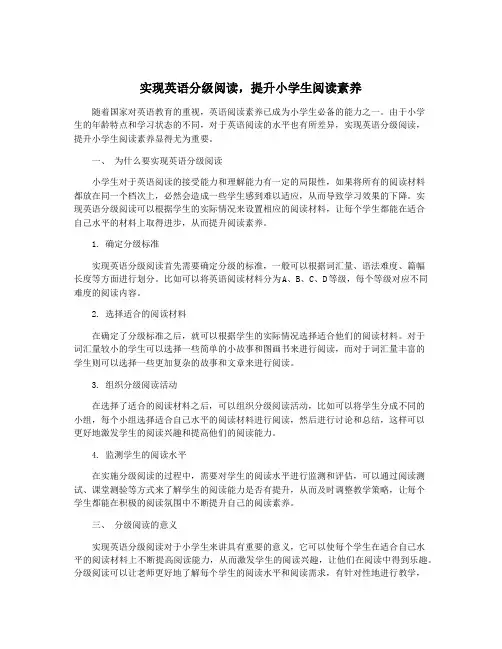
实现英语分级阅读,提升小学生阅读素养随着国家对英语教育的重视,英语阅读素养已成为小学生必备的能力之一。
由于小学生的年龄特点和学习状态的不同,对于英语阅读的水平也有所差异,实现英语分级阅读,提升小学生阅读素养显得尤为重要。
一、为什么要实现英语分级阅读小学生对于英语阅读的接受能力和理解能力有一定的局限性,如果将所有的阅读材料都放在同一个档次上,必然会造成一些学生感到难以适应,从而导致学习效果的下降。
实现英语分级阅读可以根据学生的实际情况来设置相应的阅读材料,让每个学生都能在适合自己水平的材料上取得进步,从而提升阅读素养。
1. 确定分级标准实现英语分级阅读首先需要确定分级的标准,一般可以根据词汇量、语法难度、篇幅长度等方面进行划分。
比如可以将英语阅读材料分为A、B、C、D等级,每个等级对应不同难度的阅读内容。
2. 选择适合的阅读材料在确定了分级标准之后,就可以根据学生的实际情况选择适合他们的阅读材料。
对于词汇量较小的学生可以选择一些简单的小故事和图画书来进行阅读,而对于词汇量丰富的学生则可以选择一些更加复杂的故事和文章来进行阅读。
3. 组织分级阅读活动在选择了适合的阅读材料之后,可以组织分级阅读活动,比如可以将学生分成不同的小组,每个小组选择适合自己水平的阅读材料进行阅读,然后进行讨论和总结,这样可以更好地激发学生的阅读兴趣和提高他们的阅读能力。
4. 监测学生的阅读水平在实施分级阅读的过程中,需要对学生的阅读水平进行监测和评估,可以通过阅读测试、课堂测验等方式来了解学生的阅读能力是否有提升,从而及时调整教学策略,让每个学生都能在积极的阅读氛围中不断提升自己的阅读素养。
三、分级阅读的意义实现英语分级阅读对于小学生来讲具有重要的意义,它可以使每个学生在适合自己水平的阅读材料上不断提高阅读能力,从而激发学生的阅读兴趣,让他们在阅读中得到乐趣。
分级阅读可以让老师更好地了解每个学生的阅读水平和阅读需求,有针对性地进行教学,从而提高教学效果。
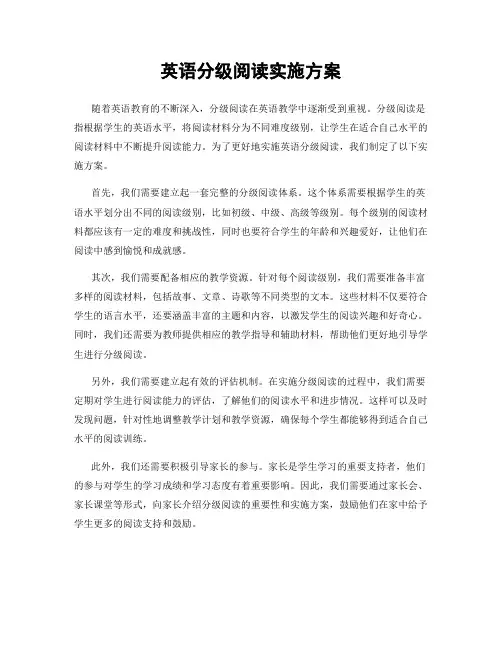
英语分级阅读实施方案随着英语教育的不断深入,分级阅读在英语教学中逐渐受到重视。
分级阅读是指根据学生的英语水平,将阅读材料分为不同难度级别,让学生在适合自己水平的阅读材料中不断提升阅读能力。
为了更好地实施英语分级阅读,我们制定了以下实施方案。
首先,我们需要建立起一套完整的分级阅读体系。
这个体系需要根据学生的英语水平划分出不同的阅读级别,比如初级、中级、高级等级别。
每个级别的阅读材料都应该有一定的难度和挑战性,同时也要符合学生的年龄和兴趣爱好,让他们在阅读中感到愉悦和成就感。
其次,我们需要配备相应的教学资源。
针对每个阅读级别,我们需要准备丰富多样的阅读材料,包括故事、文章、诗歌等不同类型的文本。
这些材料不仅要符合学生的语言水平,还要涵盖丰富的主题和内容,以激发学生的阅读兴趣和好奇心。
同时,我们还需要为教师提供相应的教学指导和辅助材料,帮助他们更好地引导学生进行分级阅读。
另外,我们需要建立起有效的评估机制。
在实施分级阅读的过程中,我们需要定期对学生进行阅读能力的评估,了解他们的阅读水平和进步情况。
这样可以及时发现问题,针对性地调整教学计划和教学资源,确保每个学生都能够得到适合自己水平的阅读训练。
此外,我们还需要积极引导家长的参与。
家长是学生学习的重要支持者,他们的参与对学生的学习成绩和学习态度有着重要影响。
因此,我们需要通过家长会、家长课堂等形式,向家长介绍分级阅读的重要性和实施方案,鼓励他们在家中给予学生更多的阅读支持和鼓励。
最后,我们需要不断完善和优化分级阅读方案。
随着教学实践的深入和学生需求的变化,我们需要不断收集教学反馈和意见建议,及时调整和优化分级阅读方案,确保其能够更好地适应学生的学习需求和教学实际。
总之,实施英语分级阅读需要建立完整的体系,配备丰富的教学资源,建立有效的评估机制,引导家长的参与,并不断完善和优化方案。
只有这样,我们才能更好地帮助学生提升英语阅读能力,培养他们的阅读兴趣和习惯,为他们的英语学习打下坚实的基础。
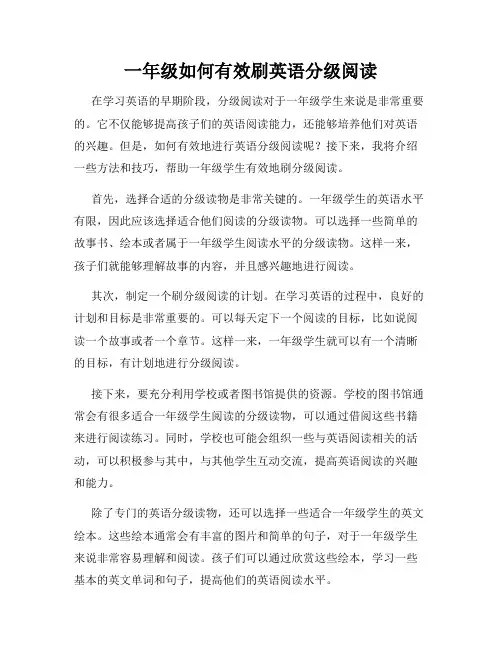
一年级如何有效刷英语分级阅读在学习英语的早期阶段,分级阅读对于一年级学生来说是非常重要的。
它不仅能够提高孩子们的英语阅读能力,还能够培养他们对英语的兴趣。
但是,如何有效地进行英语分级阅读呢?接下来,我将介绍一些方法和技巧,帮助一年级学生有效地刷分级阅读。
首先,选择合适的分级读物是非常关键的。
一年级学生的英语水平有限,因此应该选择适合他们阅读的分级读物。
可以选择一些简单的故事书、绘本或者属于一年级学生阅读水平的分级读物。
这样一来,孩子们就能够理解故事的内容,并且感兴趣地进行阅读。
其次,制定一个刷分级阅读的计划。
在学习英语的过程中,良好的计划和目标是非常重要的。
可以每天定下一个阅读的目标,比如说阅读一个故事或者一个章节。
这样一来,一年级学生就可以有一个清晰的目标,有计划地进行分级阅读。
接下来,要充分利用学校或者图书馆提供的资源。
学校的图书馆通常会有很多适合一年级学生阅读的分级读物,可以通过借阅这些书籍来进行阅读练习。
同时,学校也可能会组织一些与英语阅读相关的活动,可以积极参与其中,与其他学生互动交流,提高英语阅读的兴趣和能力。
除了专门的英语分级读物,还可以选择一些适合一年级学生的英文绘本。
这些绘本通常会有丰富的图片和简单的句子,对于一年级学生来说非常容易理解和阅读。
孩子们可以通过欣赏这些绘本,学习一些基本的英文单词和句子,提高他们的英语阅读水平。
此外,可以尝试使用一些互动学习工具来刷分级阅读。
现在有很多在线学习平台和手机应用程序可以帮助一年级学生进行英语分级阅读。
这些工具通常会提供一系列的阅读材料和练习题,通过互动的方式帮助孩子们提高阅读技巧和理解能力。
这样一来,学习英语就不再单调乏味,而是变成了一种有趣的互动体验。
总之,一年级如何有效刷英语分级阅读需要选择适合的分级读物,制定计划,利用资源,使用互动工具等多种方法综合使用。
通过这些方法和技巧,一年级学生可以更加有针对性地提高英语阅读能力,并且建立起对英语的兴趣和信心。
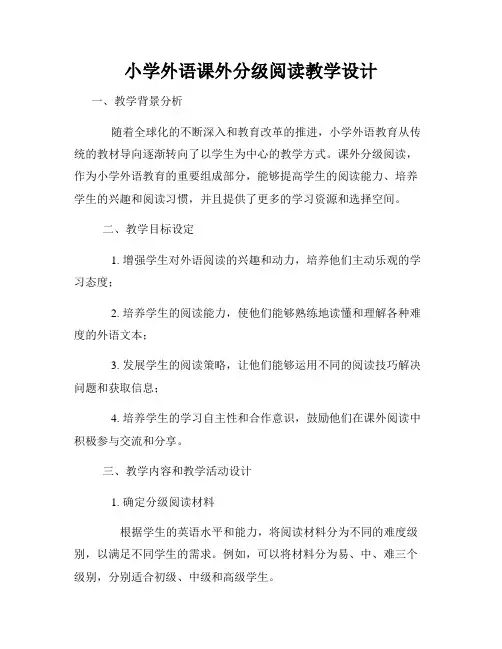
小学外语课外分级阅读教学设计一、教学背景分析随着全球化的不断深入和教育改革的推进,小学外语教育从传统的教材导向逐渐转向了以学生为中心的教学方式。
课外分级阅读,作为小学外语教育的重要组成部分,能够提高学生的阅读能力、培养学生的兴趣和阅读习惯,并且提供了更多的学习资源和选择空间。
二、教学目标设定1. 增强学生对外语阅读的兴趣和动力,培养他们主动乐观的学习态度;2. 培养学生的阅读能力,使他们能够熟练地读懂和理解各种难度的外语文本;3. 发展学生的阅读策略,让他们能够运用不同的阅读技巧解决问题和获取信息;4. 培养学生的学习自主性和合作意识,鼓励他们在课外阅读中积极参与交流和分享。
三、教学内容和教学活动设计1. 确定分级阅读材料根据学生的英语水平和能力,将阅读材料分为不同的难度级别,以满足不同学生的需求。
例如,可以将材料分为易、中、难三个级别,分别适合初级、中级和高级学生。
2. 阅读前的准备在阅读前,教师可以通过图片、标题、关键词等引导学生先对文章主题进行预测,并激发学生的兴趣和背景知识。
3. 阅读过程中的引导和指导为了提高学生的阅读能力和理解能力,教师可以采取以下策略:- 指导学生进行整体阅读,把握文章的主题和结构;- 引导学生注重细节,帮助他们理解难词和词组的意思;- 鼓励学生独立思考,提出问题,拓展阅读的广度和深度;- 使用多媒体资源,在阅读过程中加以配图、配音或配乐,提高学生的阅读兴趣和理解力。
4. 阅读后的练习和反思阅读完成后,教师可以设置一些练习题,以巩固学生的阅读理解能力。
同时,教师还可以引导学生反思自己的阅读过程,提出改进的方法和建议。
5. 学生合作分享为了增加学生的交流和互动,可以让学生以小组形式进行合作分享。
每个小组选择一个自己最喜欢的或者觉得最有意思的文章,向其他同学介绍和推荐,并分享自己的阅读体验和感受。
这样既能提高学生口语表达能力,也可以丰富学生的阅读资源和选择。
四、教学评价和反馈在课外分级阅读教学过程中,教师需要对学生的阅读成果和表现进行评价和反馈。
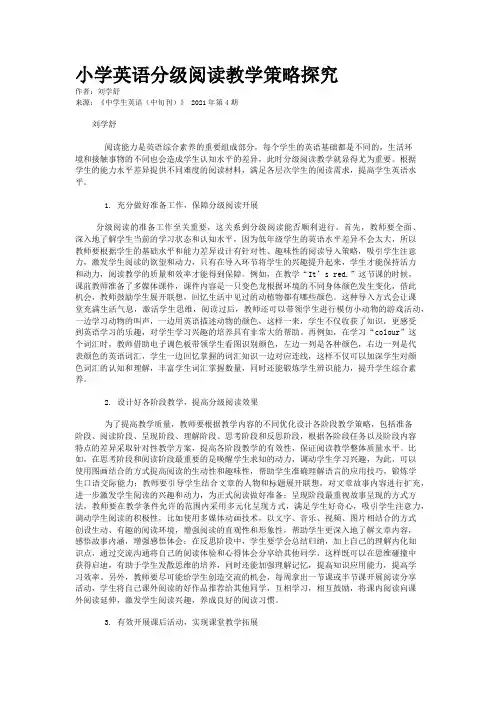
小学英语分级阅读教学策略探究作者:刘学舒来源:《中学生英语(中旬刊)》 2021年第4期刘学舒阅读能力是英语综合素养的重要组成部分,每个学生的英语基础都是不同的,生活环境和接触事物的不同也会造成学生认知水平的差异,此时分级阅读教学就显得尤为重要。
根据学生的能力水平差异提供不同难度的阅读材料,满足各层次学生的阅读需求,提高学生英语水平。
1. 充分做好准备工作,保障分级阅读开展分级阅读的准备工作至关重要,这关系到分级阅读能否顺利进行。
首先,教师要全面、深入地了解学生当前的学习状态和认知水平,因为低年级学生的英语水平差异不会太大,所以教师要根据学生的基础水平和能力差异设计有针对性、趣味性的阅读导入策略,吸引学生注意力,激发学生阅读的欲望和动力,只有在导入环节将学生的兴趣提升起来,学生才能保持活力和动力,阅读教学的质量和效率才能得到保障。
例如,在教学“It’s red.”这节课的时候,课前教师准备了多媒体课件,课件内容是一只变色龙根据环境的不同身体颜色发生变化,借此机会,教师鼓励学生展开联想,回忆生活中见过的动植物都有哪些颜色。
这种导入方式会让课堂充满生活气息,激活学生思维,阅读过后,教师还可以带领学生进行模仿小动物的游戏活动,一边学习动物的叫声,一边用英语描述动物的颜色,这样一来,学生不仅收获了知识,更感受到英语学习的乐趣,对学生学习兴趣的培养具有非常大的帮助。
再例如,在学习“colour”这个词汇时,教师借助电子调色板带领学生看图识别颜色,左边一列是各种颜色,右边一列是代表颜色的英语词汇,学生一边回忆掌握的词汇知识一边对应连线,这样不仅可以加深学生对颜色词汇的认知和理解,丰富学生词汇掌握数量,同时还能锻炼学生辨识能力,提升学生综合素养。
2. 设计好各阶段教学,提高分级阅读效果为了提高教学质量,教师要根据教学内容的不同优化设计各阶段教学策略,包括准备阶段、阅读阶段、呈现阶段、理解阶段、思考阶段和反思阶段,根据各阶段任务以及阶段内容特点的差异采取针对性教学方案,提高各阶段教学的有效性,保证阅读教学整体质量水平。
分级阅读在小学英语教学中的实践引言随着全球化的发展,英语作为一门国际通用语言,对于学生来说变得越来越重要。
而小学阶段是培养学生英语阅读能力的关键时期。
为了提高学生的英语阅读水平,分级阅读成为了一种常见的教学方法。
本文将探讨分级阅读在小学英语教学中的实践,并讨论其优势和挑战。
分级阅读的定义和目的分级阅读是一种根据学生的英语水平将阅读材料分为不同难度等级的教学方法。
其目的是让学生在适合自己水平的阅读材料中逐渐提高阅读能力,培养对英语阅读的兴趣。
实践一:选择适合学生水平的阅读材料在分级阅读中,教师需要根据学生的英语水平选择合适的阅读材料。
这些材料应该既符合学生的语言能力,又能够激发他们的学习兴趣。
例如,对于初级学生,可以选择一些简单的故事书,而对于高级学生,则可以选择一些经典文学作品。
实践二:提供相关的辅助材料为了帮助学生更好地理解阅读材料,教师可以提供一些相关的辅助材料,如词汇表、练习题和解析。
这些辅助材料可以帮助学生扩大词汇量,提高阅读理解能力,并培养他们的自主学习能力。
实践三:组织分级阅读活动分级阅读活动可以是小组活动或整个班级的合作活动。
在活动中,学生可以互相讨论阅读材料,分享自己的理解和观点。
这样的活动不仅可以提高学生的阅读能力,还可以培养他们的合作精神和表达能力。
实践四:评估学生的阅读水平为了了解学生的阅读进展,教师可以定期进行阅读水平评估。
评估可以包括阅读理解测试、口头表达和写作任务等。
通过评估,教师可以及时发现学生的问题并给予针对性的指导。
分级阅读的优势分级阅读在小学英语教学中具有许多优势。
首先,它可以满足不同学生的阅读需求。
由于学生的英语水平不同,他们对阅读材料的理解能力也不同。
分级阅读可以根据学生的实际水平提供适合的阅读材料,使每个学生都能够参与到阅读活动中来。
其次,分级阅读可以激发学生的学习兴趣。
由于阅读材料与学生的实际水平相匹配,学生能够轻松地理解和阅读,从而增加他们对英语阅读的兴趣。
实现英语分级阅读,提升小学生阅读素养
首先,我们需要使用适合小学生阅读的英语书籍。
这些书籍应该包括趣味性强、易于
理解和涵盖不同主题的内容。
在选择书籍时,应该根据学生的阅读能力和兴趣爱好来选
择。
其次,我们可以使用一些在线分级阅读工具。
这些工具可以帮助老师快速地评估学生
的阅读水平,并为他们推荐适合他们的英语书籍。
其中一些工具还可以提供互动阅读的体验,并帮助学生在理解难词和句子时提供帮助。
此外,我们还可以采用小组阅读的方式。
在小组中,学生可以交流彼此的阅读理解,
并共享他们对书籍的理解。
这也可以帮助学生在分级阅读中更好地理解复杂的句子和用
语。
最后,我们可以使用一些课外活动来激发学生的阅读兴趣。
例如,可以组织阅读比赛、朗读比赛和阅读小组讨论等活动。
这些活动可以鼓励学生积极地阅读,从而提高他们的阅
读能力和兴趣。
综上所述,通过选用适合小学生的英语书籍、使用在线分级阅读工具、采用小组阅读
的方式和开展课外阅读活动等方法,可以帮助学生提高他们的阅读素养。
浅谈小学阶段英语分级阅读活动的实施策略
小学阶段英语分级阅读活动的实施策略
在小学阶段,合理实施英语分级阅读活动,将有显著助于孩子们英语学习能力
的提高。
那么,在实施分级阅读活动时,应该遵循什么实施策略?
首先,要依据学生的知识结构和发展水平,科学的设定阅读的难易程度;以及
将会接触的文章内容,进行合理分期、分级划分。
小学生正在正常发育的关键阶段,心理、认知能力的发展仍未均衡,因此,在实施分级教学活动时,要根据学生的实际情况,配合他们的认知情况,设计分级阅读计划,实施分级识记、分级理解、分级练习等活动,以利于提高学生的英语能力。
其次,要坚持按照“熟悉的-新的”原则,从教材的模块结构出发,完成模块
的主题学习,进而做到把控,使每一课的学习内容与学生的学习水平和学习能力紧密结合,可以调节顺序,加强联系。
针对孩子文化基础薄弱、基础认知能力不足的特点,在设计英语分级阅读活动时,要注重给学生提供熟悉的词汇或语句,然后慢慢引导他们进入新的阶段,增强他们阅读时的可操作性。
此外,在英语分级阅读活动中,一定要营造融洽的氛围,建立适切的信任关系,营造良好的学习心理环境,促进学习动机的发挥,使学生能够在轻松愉悦的氛围里学习,以提高学习效率。
同时,还要培养孩子自律意识、学习热情,注重诱因刺激,鼓励学生学习和完成课后练习,过程中不断提高自我效能感、增强持久学习的动力。
总之,小学阶段英语分级阅读活动的实施策略和实施意义,在于合理的运用课
堂教学授课抽象性框架和课外阅读的拟真感受,针对孩子的心理认知状态,引导其获得真实的知识海洋。
以此为中心,可以有效地提高学生学习的集体性和个体性,加深学生对英语知识技能和思维。
幼儿园阅读课程:分级阅读教学实施方案随着社会的发展和教育理念的不断更新,幼儿园阅读课程也变得越来越重要。
分级阅读教学作为一种有效的教学方式,受到了越来越多的关注。
在幼儿园阅读课程中,如何实施分级阅读教学,是一个备受研究和关注的话题。
一、分级阅读教学的概念和意义1. 分级阅读教学是指根据学生的阅读能力和阅读兴趣,将阅读材料分为不同难度等级,让学生按照自己的能力选择适合自己阅读水平的书籍,以提高阅读效果和兴趣。
2. 分级阅读教学的意义在于能够满足不同学生的阅读需求,促进学生阅读兴趣的培养,提高阅读能力和阅读水平。
二、幼儿园实施分级阅读教学的具体方案1. 确定分级阅读教学的内容和目标:确定分级阅读教学的内容范围和目标要求,明确教学的重点和难点。
2. 选择适合的教材:根据分级阅读的原则,选择适合幼儿园阶段学生的阅读教材,保证教材的趣味性和适宜性。
3. 制定分级阅读的教学计划:根据学生的阅读水平和兴趣,制定相应的分级阅读教学计划,分阶段、分等级地进行教学安排。
4. 营造良好的阅读氛围:在教室和学校内部营造良好的阅读氛围,让学生能够自愿参与到阅读活动中去。
5. 引导学生进行分级阅读:在教师的引导下,让学生逐步认识和了解分级阅读的原则和方法,培养他们进行自主选择和阅读的能力。
6. 进行评价和反馈:通过观察和评价学生的阅读情况,及时给予学生反馈,促进他们的阅读兴趣和能力的提高。
三、分级阅读教学实施中需要注意的问题1. 调动学生的积极性:分级阅读教学要注重调动学生的学习积极性,让他们自愿参与到阅读活动中去。
2. 关注学生的学习进度:教师要关注学生的学习进度,及时发现学生的问题,提出解决措施。
3. 尊重学生的阅读选择:在分级阅读教学中,要尊重学生的阅读选择,让他们有权进行自主选择和阅读。
结语在幼儿园阅读课程中,实施分级阅读教学是一项重要的工作。
通过科学的分级阅读教学实施方案,可以促进学生阅读兴趣的培养,提高他们的阅读能力和阅读水平。
小学英语分级阅读指导方法探析分级阅读是基于不同的教学难度与文本阅读要求演化而来的一种阅读指导方法,其对小学生抵触阅读教学、缺乏阅读学习经验的现状逐步发挥作用,从而启发学生的阅读能力与文化应用意识。
在实施分级阅读教学的同时,要关注对教材、教学活动的分级,设计梯次式阅读指导模式,开发多元阅读指导模块,保障学生适应阅读学习活动,从而逐步提升学生的英语阅读效率。
一、小学英语实施分级阅读的意义(一)保障学生适应阅读活动结合英语文本展开阅读教学指导工作,要关注学生的英语应用能力,发展学生的语言认知素养,基于教材的角度引入语言交际、语言文化探究、语言灵活应用等活动,促使学生适应英语教学课堂,掌握阅读学习技巧。
传统的小学英语阅读指导单纯围绕着教材文本发力,学生虽然在进行阅读学习,但学习能力的差异、文本要求的差异使学生难以及时掌握阅读学习方法,教材中的部分长句、难句与语法在一定程度上提升了阅读学习难度,学生很难获取相应的阅读学习经验。
分级阅读的出现则改变了这一教学机制:学生可以结合自身素质与语言技能进行有效阅读,根据阅读学习要求调整学习目标,掌握多元化阅读方法。
在分级阅读指导活动中,教师可按照文本难度、学生素质设计对应的分级阅读目标,强化学生的语言理解能力,让学生适应阅读活动,进而加深学生对文本资源的认识。
(二)发展学生语言素养围绕文本开展的阅读指导活动应该呈现出多元教学价值,除了帮助学生认知基础英语知识之外,还要加强对学生语言理解能力与语言认知能力的训练,在教学的过程中启发学生的英语学习热情,促使学生形成优秀的语言素养。
语言应用、语言理解、语言文化探究多元合一,才符合新时代下课程改革的教学要求。
但从学生的英语学习能力来看,传统的小学英语阅读指导机制遵循“一把抓”,对于教学难点、教学重点缺乏重视,学生的语言学习经验无法被调动起来。
在分级阅读的指导下,学生可以在阅读、学习的过程中分享英语知识,基于英语交流视角展开互动,让学生将英语中的俗语、成语、日常交际用语应用到学习过程当中,提升学生的语言学习技能。
小学英语分级阅读的操作策略作者:李晨来源:《启迪与智慧·上旬刊》2021年第06期小学英语分级阅读是指教师围绕学生英语素养的不同层级,遴选不同的阅读内容,让每一个孩子都能得到更好地发展,充分发挥阅读材料的最大教学效益。
教師在小学英语教学中要贯彻因人而异、因材施教的教学原则,通过分级阅读教学策略,切实提高学生的英语阅读素养。
一、根据学情,遴选阅读内容在小学英语教学中引入分级阅读,关键是要从学生的兴趣爱好出发,准确把握学生学情和认知特点,让阅读内容和儿童趣味同频共振。
开展英语分级阅读,主要以学生自主阅读为主,学习兴趣是推动学生自主学习的内在动力。
为了激发学生的阅读兴趣,教师选择的阅读材料要充满趣味性,贴近学生生活,才能让学生沉浸其中。
比如,在“Unit7 On the farm”(译林版小学英语三B)一课教学中,教师为了提升课堂教学效率,可以优化教学策略和教学结构,适时推荐生动形象的绘本阅读,引导学生基于绘本故事开展深度阅读。
“On the farm”是这个单元的主题词,故事发生的地方在farm,因此教师不妨向学生推荐相关的绘本故事《Morning on the farm》。
引导学生在Anna与Sam的带领下,通过阅读理解“As the sun rose,the rooster crowed”等绘本段落,走进早晨农场的生活情境,感悟生命的活力和热闹。
学完教材文本,适时引入内容相关联的课外绘本,能够激发学生阅读的主动性,不但拓宽了学生的阅读视野,也提升了学生的阅读素养。
需要注意的是,教师在课堂上开展分级阅读之前,一定要结合教材文本特点,准确把握学生的兴趣爱好,遴选匹配度高的绘本读物,才能吸引学生潜心阅读,确保取得良好的阅读效果。
二、基于对话,优化分级阅读深度推进新课程改革背景下,英语等语言类学科要更加重视培养学生的言语表达能力。
从语言学角度看,对话交流不仅促进思维碰撞,还能反作用于文本阅读,有利于学生深入理解文本内容。
少儿英语分级阅读怎么开展?
少儿英语教育内容纷繁复杂,听说读写都会提上一个更高的等级,那么针对其中的少儿英语
阅读是应该怎样在教学实际中开展呢?有着11年少儿英语培训经验的瑞思学科英语,是以
分级阅读来提升孩子的英语学习水平的,通过少儿英语分级阅读,来巩固和训练孩子的拼读
能力,使阅读更加有效,继而从书中获得更均衡的营养。
国内外专家多年来的大量研究表明,孩子在不同成长时期,其阅读需求和阅读能力是不同的。
之所以需要针对不同孩子采取分级的方式阅读,就是根据不同孩子的生理和心理的发育程度
而提出的科学的阅读方法。针对少儿英语学习期的孩子们,需要阅读符合他们年龄心智特点
的图书,这样才不会感到阅读的难度和挫伤阅读的积极性,同时又能汲取书籍的营养来助长
学习兴趣和动力。
在阅读年龄居次上来讲,从孩子3岁开始,就可以有意识地引导少儿英语启蒙阅读了,可以
用“半图半文”的桥梁书进行过渡,同时也开始学习英语的自然拼读;然后逐渐在家长和老
师的辅导下,进行独立阅读,这时候就需要读章节书和分级读物了。当孩子完成了英语音素
知识和自然拼读的学习,就可以进行英语的分级阅读了。这将使孩子英语语言水平、掌握阅
读方法、养成阅读习惯、建立阅读自信、获得阅读快乐,为孩子一生自由阅读和自由表达打
下牢固的根基。
就瑞思少儿英语分级阅读来讲,正确引导,让“阅读”变“悦读”,首先得引导孩子逐步深入地
发现阅读的乐趣。其次,要给孩子营造一个愉悦的阅读氛围,让孩子把阅读和其他引发愉悦
感的事情关联起来,除此之外,让孩子把“阅读”变为“悦读”,最重要的是选择符合孩子喜好
和阅读能力的书。能够用心读下去,是享受阅读的最基本的条件。
关于瑞思学科英语
2007年进入中国,
率先从事学科英语教育培训,3-18岁少儿英语培训专家,其“浸
入式学科英语”课程体系涵盖3~6岁幼儿英语、7~12岁儿童英语、13~18岁
青少儿英语,并注重培养项目管理、演讲演示和团队合作三大能力。
每天,全国80多个城市250多家校区10万多名学员在瑞思同步学习;
每年,数十万家庭选择瑞思,九成以上的家庭选择持续续费,让孩子一直在瑞思
学习,直至进入美国名校。